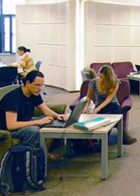A Zionist Citadel?

The annual meeting of the board of governors of the Hebrew University of Jerusalem takes place this week in Israel's capital. Not unlike the state that it preceded into existence, the university, opened 85 years ago on Mount Scopus in northeast Jerusalem, is in the throes of crisis.
With the end of World War I, and the arrival of the British mandate, the Zionist leader Chaim Weizmann helped to spearhead the creation of a "university of the Jewish people." In 1918, twelve foundation stones were laid. Five years later, Albert Einstein delivered the nascent university's first formal lecture—on the theory of relativity. The official opening ceremonies took place in 1925 in the presence of Lord Balfour, Lord Allenby, and the Zionist leadership. Judah Magnes, a prominent American Reform rabbi and a proponent of Jewish-Arab binationalism, became the institution's chancellor, awarding the first degree in 1931.
From the day of its inauguration, the fate of the university has been intertwined with that of Zionism and, later, the state of Israel. In its first decades, even as it wrestled with the challenges of institution-building, the university offered a platform for the (often fierce) competition of ideas, helped to develop the country's human potential, and encouraged Jewish-Arab coexistence. The university's teaching hospital, thanks to the munificence of the Hadassah Women's Zionist Organization, took its first steps toward becoming a preeminent medical center.
In April 1948, Arab gunmen slaughtered a convoy of medical and university personnel making their way through east Jerusalem to Mount Scopus. After the close of hostilities in the 1948-49 War of Independence, with Mount Scopus too dangerous to get to, classes were scattered throughout west Jerusalem until an alternative site could be built at Givat Ram. Only with the 1967 reunification of the city was the original campus re-developed into the flourishing place it is today.
Today, the university continues to mirror some of the salient features, and paradoxes, of life in the Jewish state and of the larger struggle for Jewish national survival. In a Jerusalem inhabited increasingly by ultra-Orthodox Jews and Arabs, two populations equally indifferent if not actively hostile to Zionism, the university discharges its duty of national service by, for example, offering a fast-track, physician-training program in "military medicine." At the same time, outspoken members of its faculty and student body are notorious for their compulsive anti-Zionism and obsessive embrace of the Palestinian Arab cause.
Day to day, the crisis that most concerns the university is financial. Government support has been reduced by $8 million annually, at a moment when the global economic downturn has caused a precipitous drop in foreign donations. The university is additionally saddled by burdensome pension obligations and an annual $7-million bill for security (nine students and staff were murdered in a 2002 bombing by Palestinian terrorists). In its most recent fiscal year, the institution registered a $30-million deficit.
On the other side of the ledger, the university has managed to garner significant grants for researchers; its Amirim program successfully identifies and nourishes undergraduates with outstanding potential; it has made some progress enticing scholars lost to Israel's brain drain; and it has recently instituted a much-needed remedial program for insufficiently prepared freshmen who arrive on campus after their military service.
In its own way, and again not unlike the state it preceded into existence, the situation of the Hebrew University offers sufficient grounds for both pessimism and determined hopefulness.
Comments are closed for this article.




